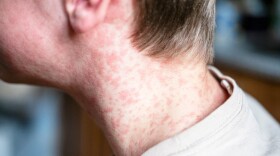As we head into our second weekend after Hurricane Ian, United States Coast Guard and Florida Fish and Wildlife officials are requesting recreational boaters to stay off the water, if at all possible.
"While the initial search and rescue part of the Hurricane Ian response is over, we continue to do work in the areas most impacted, said Petty Officer First Class Ayla Hudson with the U.S. Coast Guard. "So, what we would ask is that the public stay off of the water unless they absolutely have to be out there. And that they stay out of the way of vessels that are directly involved in a response."
If boaters must go out, Hudson recommends exercising extreme caution.
"After a storm, a lot of things move around underneath the water, so things aren't where they originally were before the storm. So, we want people to lookout for hazards that could cause damage to the boat or their propellers and potentially injury. And if they do come across hazards, they can report that to the Coast Guard or FWC," she said.
A press release from Florida Fish and Wildlife reiterated that caution. "If you must go on the water, proceed with extreme caution, maintain a safe speed at all times and remember Florida Statutes require all vessel operators to maintain a slow speed (minimum wake) within 300 feet of any emergency vessel when the emergency lights are on. Even if you are familiar with the route and surrounding area, expect to find new underwater hazards, so pay close attention and look out for submerged navigation aids and changes to water depth caused by shifting sands. Storms can cause hazardous water conditions by altering the location and condition of pilings, trees, shoals, sandbars and navigation markers. As always, ensure you and any passengers on board are wearing lifejackets."
The U.S. Coast Guard, according to a press release, is working hard to support the State of Florida in providing the necessary resources and services to clean up potential pollution sources and restore waterways and coastal infrastructures like bridges and piers.
They recommend the below tips to all mariners in heavily damaged areas including Fort Myers, Sanibel Island, Pine Island, Naples and Matlacha islands.
- Stay off the water unless you are playing a critical role in the response. This is not a time for disaster sightseeing. The Coast Guard other responders are actively engaged in restoring our waterways and maritime infrastructure. You can help by steering clear.
- Stay out of the way of the boats directly involved in the response. If you need to be on the water, please stay out of the way of the responders and transit at bare steerageway so you do not wake out crews working on vessels and barges.
- Buoys, day boards and other aids to navigation may be off station if shifted by the hurricane. Water depths may be shallower than charted due to shifting sands and shoals. If you encounter an off station buoy or navigational marker, report it to the USCG.
- Beware of construction materials like wood, nails, glass and concrete that may be encountered on beaches and in canals. Report hazards to local lifeguards or beach patrol. If you encounter chemicals or oil pollutants in the waterways, report them to the USCG.
- Be on the lookout for underwater hazards. The storm surge and high winds displaced and damaged many vessels, which means that sunken boats and other obstacles may be just under the surface and will damage your boat, engine or propeller.
- Turn around, don’t drown. Do not intentionally drive your vehicle into flooded or washed out areas. You may underestimate the depth and become stuck or damage your vehicle.
- Before operating your own boats and personal watercraft that were exposed to the storm, check that your fuel was not spoiled by rainwater or seawater which may render them inoperable. Verify your watertight integrity to ensure your hull was not damaged and that your bilge pumps work before getting underway.
- Be sure you have a working VHF marine radio and a cell phone with a charged battery in case of emergency.
- If you are on the water, ensure that you and your passengers are wearing USCG-approved lifejackets.
- For those who evacuated and are returning to their homes in impacted areas that are inaccessible due to damaged bridges or roadways, do not pay for an unlicensed boat operator to transport you and your loved ones.
- Always ask for credentials before paying for any waterborne services.
- Do not operate personal unmanned aerial vehicles (drones) around working crews or any low-flying aircraft.
Should local boaters decide to venture out, Hudson urges overall caution.
"Be mindful of where your vehicle is going. There's a lot of damaged roadways that are around water and islands that were impacted. So just you know, if you don't need to go out on the water or near the water, please don't. Stay out of the way of first responders and if you come across hazards, report it to the appropriate authorities," she said.
As a reminder, people in distress should use 911 to request assistance whenever possible, or VHF radio channel 16 for mariners. Social media should not be used to report distress.
Report missing or damaged waterway markers by calling 866-405-2869 or by filling out an online form at MyFWC.com/boating, by clicking “Waterway Management” then “Waterway Markers” and “Reporting Damaged/Missing Waterway Markers.”For information on how to help in the response effort, visit Emergency Management - Volunteer Florida.
WGCU is your trusted source for news and information in Southwest Florida. We are a nonprofit public service, and your support is more critical than ever. Keep public media strong and donate now. Thank you.




